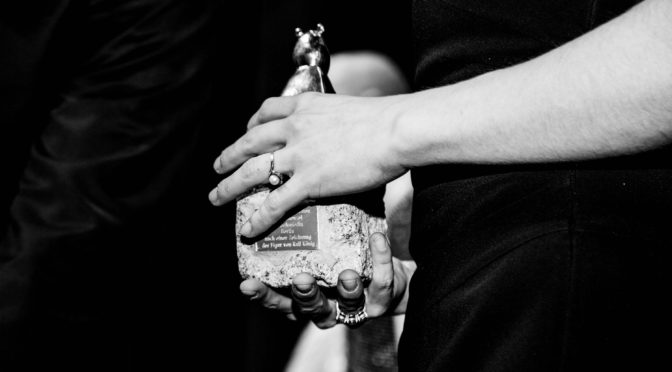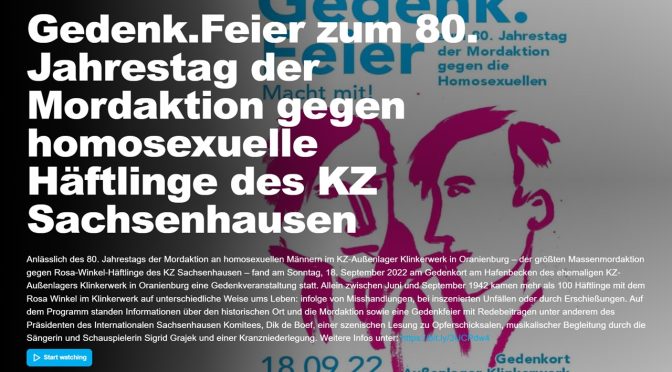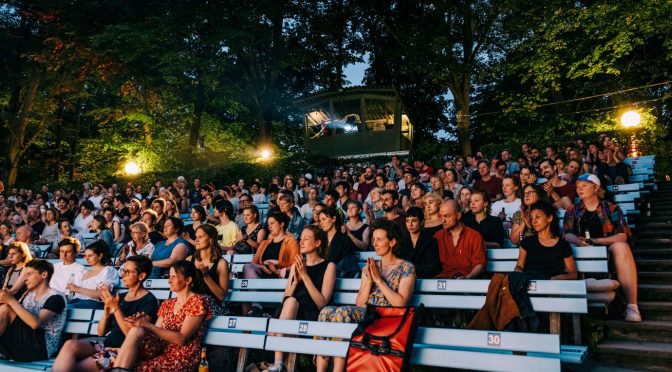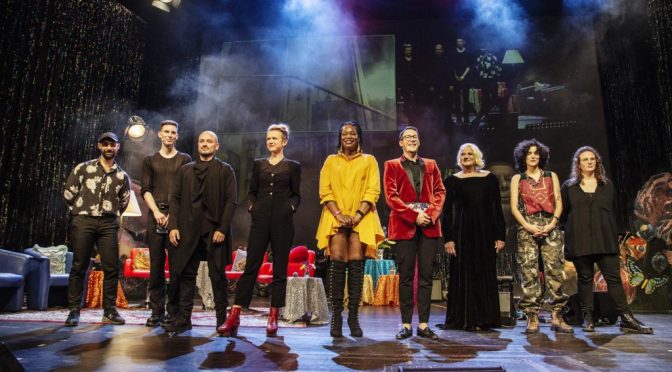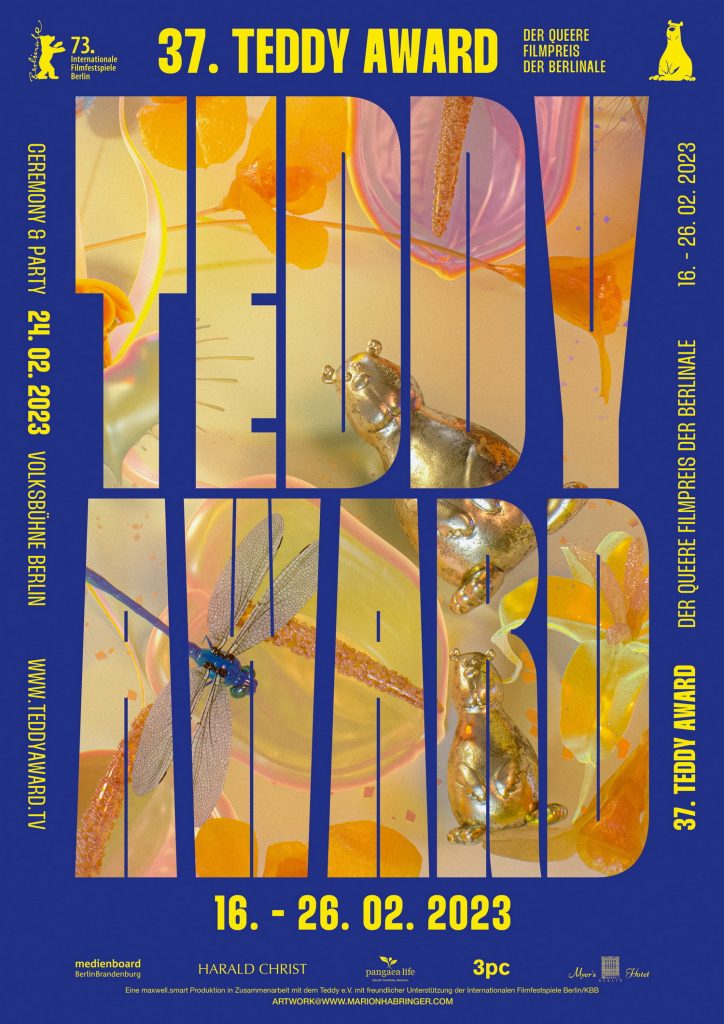
Filmanmeldung 37. TEDDY AWARD
Hier könnt ihr euren Film für die 73. Berlinale anmelden. Eingeladene Filme mit queeren Inhalten gehen dann für den 37. TEDDY AWARD ins Rennen. Bitte beachtet die Einreichtermine und die Regularien.
Anmeldschluss:
Langfilme: 02. November 2022
Kurzfilme: 16. November 2022
Serien: 23. November 2022
Um einen Film für die Berlinale anzumelden, müsst Ihr dem Festival innerhalb der Anmeldefrist den Film und die vollständige ausgefüllte Filmanmeldung zukommen lassen. Bitte lest in jedem Fall die Allgemeinen Einreichbedingungen und die weiteren Hinweise zur Filmanmeldung.
Gedenk.Feier zum 80. Jahrestag der Mordaktion gegen homosexuelle Häftlinge des KZ Sachsenhausen
Anlässlich des 80. Jahrestags der Mordaktion an homosexuellen Männern im KZ-Außenlager Klinkerwerk in Oranienburg – der größten Massenmordaktion gegen Rosa-Winkel-Häftlinge des KZ Sachsenhausen – fand am Sonntag, 18. September 2022 am Gedenkort am Hafenbecken des ehemaligen KZ-Außenlagers Klinkerwerk in Oranienburg eine Gedenkveranstaltung statt. Allein zwischen Juni und September 1942 kamen mehr als 100 Häftlinge mit dem Rosa Winkel im Klinkerwerk auf unterschiedliche Weise ums Leben: infolge von Misshandlungen, bei inszenierten Unfällen oder durch Erschießungen.
Zu der GedenkFeier hatten die Gedenkstätte und das Museum Sachsenhausen gemeinsam mit der Landeskoordinierungsstelle Queeres Brandenburg, Katte e.V., dem LSVD Berlin-Brandenburg, dem Gesprächskreis Homosexualität / Evangelische Adventkirche Berlin-Prenzlauer Berg und dem SchwuZ. Teddyaward.tv hat die Veranstaltung unterstützt, den Videomitschnitt findet ihr hier.
Auf dem Programm standen Informationen über den historischen Ort und die Mordaktion sowie eine Gedenkfeier mit Redebeiträgen unter anderem des Präsidenten des Internationalen Sachsenhausen Komitees, Dik de Boef, einer szenischen Lesung zu Opferschicksalen und musikalischer Begleitung durch die Sängerin und Schauspielerin Sigrid Grajek und eine Kranzniederlegung.
Moderation:
Christopher Schreiber, LSVD Berlin-Brandenburg.
Begrüßung:
Agnes Ohm
Sammlungsleiterin der Gedenkstätte Sachsenhausen
Grußworte:
Tobias Dünow
Staatssekretär im Ministerium für Wissenschaft, Forschung & Kultur
Ulrich Keller
LSVD Vorstandsmitglied
Uwe Fröhlich
Katte e.V.
Lothar Dönitz
Gesprächskreis Homosexualität der ev. Adventkirche Berlin Prenzlauer-Berg
Ansprache:
Dik de Boef
Präsident des Internationalen Sachsenhausen Komitees
Gedenkort am Hafenbecken des ehem. KZ-Außenlagers Klinkerwerk
An der Lehnitzschleuse. 16515 Oranienburg.
Weitere Infos unter:
stiftung-bg.de
lsvd.de
Berlinale Goes Open Air 2022
Vom 15. bis 29. Juni präsentiert die Berlinale einige Festival-Highlights aus dem Februarprogramm in sommerlicher Atmosphäre unter freiem Himmel. In Kooperation mit fünf Berliner Freiluftkinos sowie den Verleihern der jeweiligen Filme werden an 15 Abenden Filme aus verschiedenen Berlinale-Sektionen gezeigt. Die Filme werden von der Festivalleitung oder einer*m Sektionsverantwortlichen der Berlinale vorgestellt. Zu einigen Vorführungen werden zudem Filmteam-Gäste erwartet.
Auch die Teddy Award Gewinner Nelly & Nadine und Mars Exalté sowie Starfuckers und Sublime sind im Programm zu sehen
Das komplette Open Air Programm findet ihr hier bei der Berlinale.
TEDDY TODAY: 20. Februar 2022
Heute endet die Berlinale 2022. Zehn Tage voller Filmpremieren, Interviews und natürlich der Verleihung der GOLDENEN BÄREN und der TEDDY AWARDS. Trotz aller Einschränkungen sind wir glücklich, dass wir mit dem TEDDY ein Zeichen setzen konnten, dass auch ein Virus uns nicht davon abhalten kann, queeres Leben und queere Kreativität und Solidarität zu feiern. Es war uns eine Ehre, mit dem 36. TEDDY AWARD unseren Beitrag zu leisten und einen Regenbogen queerer Freude, Sichtbarkeit und Gemeinschaft mit euch zu teilen.
Auf dass die nächste Berlinale und der nächste TEDDY AWARD wieder zu den glitzernden Events werden, die wir kennen und lieben.
Bleibt fröhlich und gesund – wir sehen uns im Februar 2023! 😘
RERUNS:
Aos dezasseis (At Sixteen)
20.02. / 15:00 CinemaxX 1
20.02. / 15:00 CinemaxX 2
20.02. / 17:30 International
Bashtaalak sa’at (Shall I Compare You to a Summer’s Day?)
20.02. / 21:00 CinemaxX 5
Berdreymi (Beautiful Beings)
20.02. / 20:00 CinemaxX 3
Blaues Rauschen (Blue Noise)
20.02. / 15:00 CinemaxX 1
20.02. / 15:00 CinemaxX 2
20.02. / 17:30 International
Brainwashed: Sex-Camera-Power
20.02. / 14:30 CinemaxX 4
Calcinculo (Swing Ride)
20.02. / 15:00 Zoo Palast 1
Concerned Citizen
20.02. / 20:30 CinemaxX 4
Diva
20.02. / 17:30 International
Dreaming Walls
20.02. / 21:00 Zoo Palast 2
Jail Bird in a Peacock Chair
20.02. / 17:30 International
Ladies Only
20.02. / 11:00 International
A Love Song
20.02. / 12:30 Zoo Palast 1
Nel mio nome (Into My Name)
20.02. / 11:00 Cubix 9
Peter von Kant
20.02. / 18:00 Friedrichstadt-Palast
Queens of the Qing Dynasty
20.02. / 18:00 Akademie der Künste
The Rising
20.02. / 13:45 CinemaxX 9
Sab changa si (All Was Good)
20.02. / 20:00 Werkstattkino@silent green
Soum
20.02. / 15:30 Titania Palast
20.02. / 17:30 International
Starfuckers
20.02. / 15:30 Titania Palast
20.02. / 17:30 International
Le variabili dipendenti (The Dependent Variables)
20.02. / 15:30 Filmtheater am Friedrichshain
West by God
20.02. / 15:00 CinemaxX 1
20.02. / 15:00 CinemaxX 2

